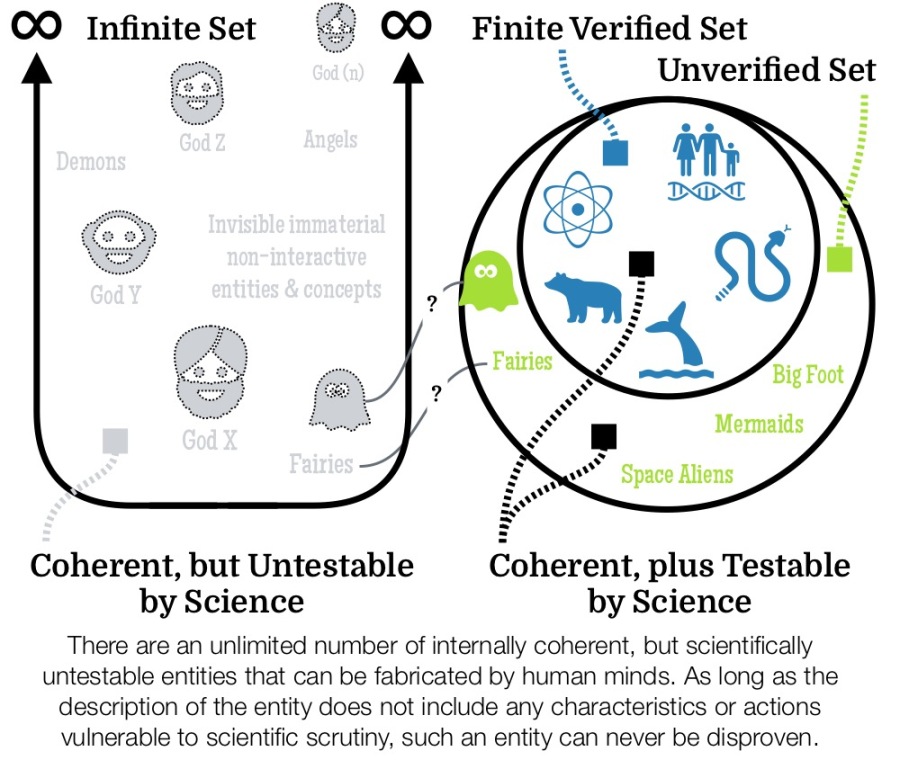 Imagine we are tasked with answering all the deep questions humans ask about life. We would want to answer questions about human purpose and meaning, questions corresponding to the strong emotional needs of humans, and questions about other deep truths about the universe. Can science or religions better provide the most satisfying answers to these questions? Religions can, right? Because religions are largely unconstrained by scientific testing, any religious system that is self-consistent will answer more of these questions than does science. Do you have a fear of death? Religion can simply invent and offer you an post-death paradise. Science can’t. Science is constrained by very strict standards of evidence. Do you yearn for a cosmic purpose to make life meaningful? Most religions suggest there is a God who has a customized plan for you. Questions about justice, suffering and love are similarly answered. Are not the answers religions can provide to deep questions indicative of the truth of those religions? And if Christianity can provide the most answers to deep questions, does that not make Christianity the truest religion?
Imagine we are tasked with answering all the deep questions humans ask about life. We would want to answer questions about human purpose and meaning, questions corresponding to the strong emotional needs of humans, and questions about other deep truths about the universe. Can science or religions better provide the most satisfying answers to these questions? Religions can, right? Because religions are largely unconstrained by scientific testing, any religious system that is self-consistent will answer more of these questions than does science. Do you have a fear of death? Religion can simply invent and offer you an post-death paradise. Science can’t. Science is constrained by very strict standards of evidence. Do you yearn for a cosmic purpose to make life meaningful? Most religions suggest there is a God who has a customized plan for you. Questions about justice, suffering and love are similarly answered. Are not the answers religions can provide to deep questions indicative of the truth of those religions? And if Christianity can provide the most answers to deep questions, does that not make Christianity the truest religion?
Religions, constrained only by internal consistency, have the freedom to invent any entity or concept necessary to provide answers to all the vexing questions we ask about life. Religions exempt themselves from scientific scrutiny by making their most fundamental entities and concepts untestable. Sometimes religions simply make their entities and concepts spiritual, and therefore largely inaccessible to the instruments of science. Many religious leaders actually claim it is improper to try to scientifically test the religion. So, while science does offer far fewer answers to life’s deep questions, religions have full freedom of the imagination to invent any entity and concept necessary to answer them all. So long as there is a general internal consistency within the web of that religion’s doctrines, that religion can boast answers that can not be disproven. If that religion can then convince a community of humans that an ideology that answers most of the deepest questions humans ask is also likely true, that religion will likely propagate through that community. However, once we think clearly about this, it becomes quickly apparent that having more answers is not equivalent to being more truthful, especially when the answers are largely dependent on untestable entities and concepts.
Consider the notion of lightning. Prior to modern science, each religion explained lightning as a phenomenon caused by their respective untestable deities without the fear of having those deities disproven by science. Some religions went so far as to claim lightning was judgment for sins, a claim bolstered by the sulfuric smell of lightning strikes similar to a Hell of brimstone, another scientifically unsubstantiated concept. As long as you are not constrained by science and are careful to keep your web of unsubstantiated entities and concepts internally consistent, you can answer every single troubling question humans can ask.
So is the ability of any given religion to answer all of the deeper questions in life indicative of its truth? Nope. It may be merely a measure of the creativity of story-tellers, story-tellers unconstrained by scientific scrutiny as many of the invisible and spiritual elements of their stories are safely insulated from the probing of science.
ADDITIONAL NOTES:
How many possible answers are there to a question if the answers are unconstrained by normal standards of evidence? An infinite number. Your missing keys can be explained by not only gremlins, elves, vampires, Satan, fairies and evasive space aliens, but also by any other self-consistent entity you can invent. Others will not be able to disprove your entity so long as you define your explanatory entity as scientifically inscrutable. You can give your entity the ability to be invisible, pass through physical objects, time travel, and bend physical laws so they’ll be insulated from the scrutiny of science.
There is one notable disadvantage in this. You’ll have to subscribe to the modus operandi of a liar. The little boy who claims he has a big brother who can jump over a house in a single bound will also need to make sure that this alleged big brother is perpetually unavailable to his friends who might doubt the claim. Invoking invisible and non-interactive entities to answer deep questions has this same liability. Your claims will smell of dishonesty.
Someone might ask what an internally consistent, but scientifically inscrutable set of beliefs might look like. Consider the rich literature on vampires. It posits characteristics of vampires such as their thirst for blood, aversion to sunlight and garlic, and ability to vanish at will. As long as one constrains the elements of their vampire stories to initial assumptions about vampires, their theory of vampires will be internally consistent…though scientifically inscrutable since one fundamental assumption is that vampires can easily escape attempts to study them scientifically.
(See also #25, #38 & “Supplementary F”)


